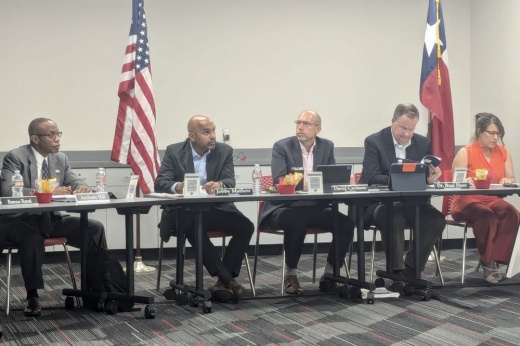As the district anticipates a nearly $10 million budget shortfall in fiscal year 2024-25, it has considered mitigation tactics such as evaluating buildings and facilities for possible consolidation and calling a VATRE. These tactics could also relieve the burden of funding staff raises amid budgetary constrictions.
The VATRE would raise the tax rate, resulting in a $147 annual tax increase per household and generating $2.4 million per year for the district, Chief Financial Officer Diana Sircar told Community Impact. Texas House Bill 3 requires districts pursuing a tax rate election to conduct an efficiency audit, which the CISD board approved at an April 22 meeting. The bill also provides guidelines that structure the audit process.
If the district decides to pursue the VATRE, the election has to occur in November, and the board of trustees must call for it by Aug. 19, Sircar said.
The details
The purpose of an efficiency audit is to provide information to voters regarding a school district’s fiscal management, efficiency and resource use before electing to change the tax rate, said Beau Shelby, senior accountant at Rutherford, Taylor and Company P.C. The audit results were based on 2021-22 data.
CISD data was compared to averages from eight surrounding peer districts based on population size, proximity, student makeup and resources, Shelby said. District figures were also compared to state averages. Comparative districts included:
- Boerne ISD
- Burleson ISD
- Carroll ISD
- Grapevine-Colleyville ISD
- Highland Park ISD
- Lake Travis ISD
- Rockwall ISD
- Wylie ISD
These revenue figures do not account for recapture, which is excess local tax revenue districts repay to the state, Shelby said. The district anticipates to return $24 million to the state in recapture payments in FY 2024-25, per district documents.
More details
District expenses per student exceeded its revenue by $300, and were lower than peer district and state averages of $10,748 and $12,382, respectively. CISD spends almost 81% of its funds on staff compensation, slightly above the 79% for peer districts and 78% for the state, Shelby said.
The average salary for Coppell teachers was higher than its state and peer district counterparts at $64,686, according to audit documents.
“With the higher salaries comes a higher quality of teachers,” Shelby said.
Teachers comprise over 60% of CISD staff compared to 53% for peer districts and nearly 49% for the state. These factors also contributed to CISD spending a higher percentage of funds on instruction and related services than comparable districts. Other than salaries, there were no outlying discrepancies in spending between Coppell ISD and peer districts, Shelby said.
“After reviewing the data, [Coppell ISD] is right in line with everybody else,” certified public accountant Robert Lake said.
Also of note
The district also sent out a community survey to get resident feedback about calling a VATRE and increase the property tax rate. The survey was conducted June 18-23 and received around 300 responses, Chief Communications Officer Angela Brown said.
About 42% of those surveyed supported increasing the tax rate. However, when the question was reposed at the end of the survey after respondents were informed about the need for the VATRE through preceding questions, that number rose to 61%, Brown said.
“With education and information, we were able to move the vote,” Brown said.
While board members showed concern over the compressed timeline and turbulent November election season hampering the VATRE’s success chances, trustees remained confident that district staff can properly inform voters in time.
“We can say this money will be used for salaries, safety and security, classrooms; we can identify what those reasons are at every opportunity before the election,” Brown said.
The board directed staff to move ahead with VATRE plans, but trustees can still choose to not call the election and must decide by Aug. 19. The last time the district held an election to increase the tax rate was 2010, then called a tax ratification election, according to district documents.
“With the audit and the survey, I am hearing the same message, ‘We all value our teachers and want to pay them well,’” trustee Leigh Walker said.





